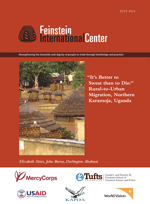Much of the literature on urbanization focuses on migration to large cities. In contrast, this report traces the process, challenges, and opportunities of rural-urban migration to towns and small cities in northern Karamoja, namely Abim, Kaabong and Kotido. The research aimed to better understand how and why men and women moved to the urban areas and to document their livelihood strategies and aspirations after migration. The findings highlight the increasing importance of urban centers in household livelihood diversification in the region, but also show that maintaining ties to rural areas is a key strategy for migrants. Strong rural-urban ties enabled respondents and their rural household members or relatives to balance risk and effectively manage assets. Those respondents who lacked rural ties were the most vulnerable members of the study population. These were overwhelmingly widowed or abandoned women. The report ends with recommendations for national and international actors working in the Karamoja region.
“It’s Better to Sweat than to Die:” Rural-to-Urban Migration, Northern Karamoja, Uganda

July 2014
ASSOCIATED PROJECT
SUBJECTS
PUBLICATION TYPE
LOCATION
RELATED PUBLICATIONS
This desk study explores how state-owned policies and programs in pastoral areas of the Sudano-Sahel and the Greater Horn of Africa meet pastoralists’ needs and priorities.
•
October 2024
This report outlines an anticipatory insurance product designed to support farmers in the drought-prone regions of Malawi and Zambia.
•
August 2024
The time pressure involved in designing and implementing anticipatory action can discourage the localization of decision-making. Learn more from a cartoon-infused summary of insights.
•
July 2024
Early Warning Systems can reduce deaths and damages caused by extreme weather events, if investors address gaps in communication and planning. Learn more from a cartoon-infused summary of insights.
•
July 2024
This synthesis report reflects upon Phase 1 findings on humanitarian action in pastoral drylands of the Greater Horn and Sudano-Sahel.
•
June 2024
This desk study examines common perceptions of pastoralism among humanitarians and barriers to international humanitarian systems meeting pastoralists’ needs.
•
June 2024






